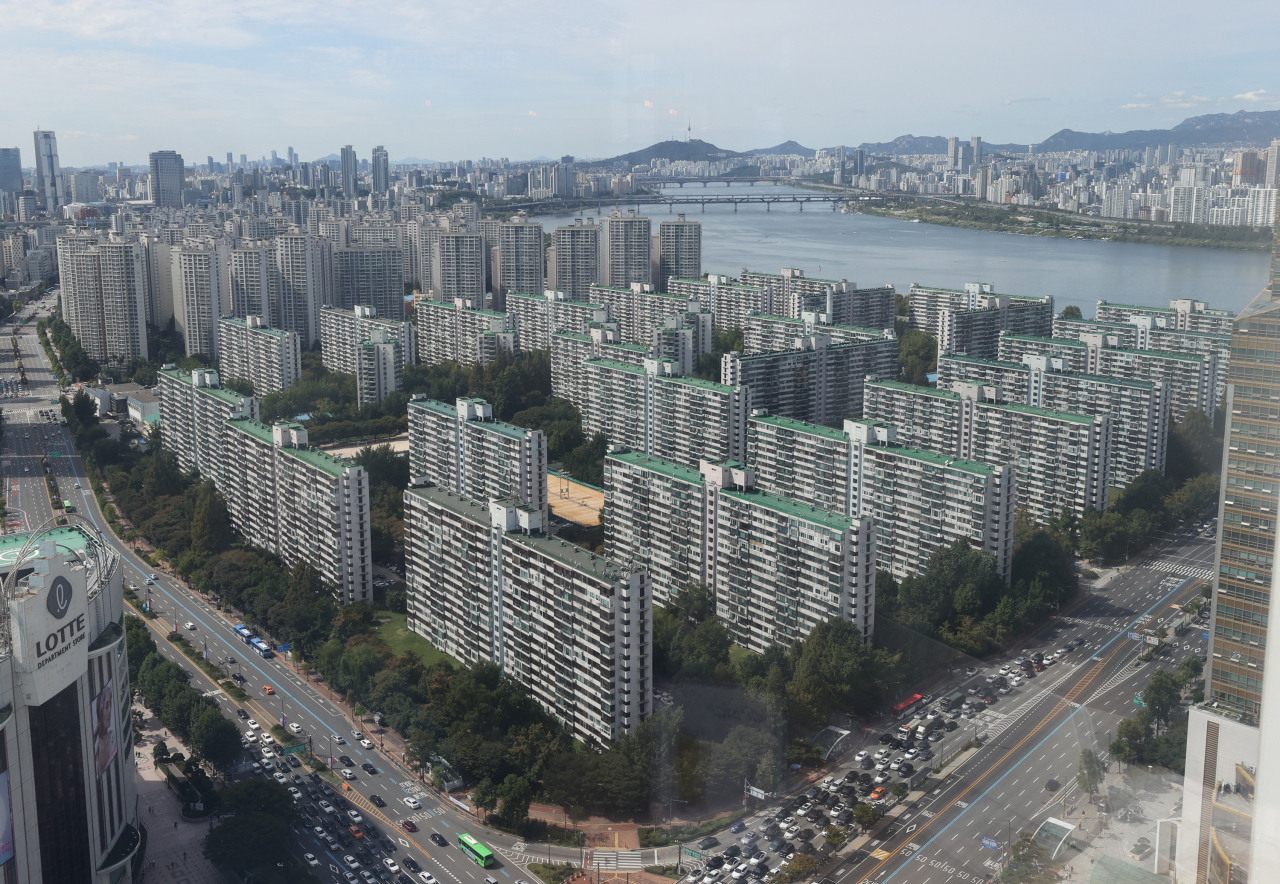Market Now
Concerns rise over foreign property speculation
 |
Aerial view of an apartment complex in Seoul (Yonhap) |
While South Korea’s financial authorities tightened their grip on property speculation and the resulting price hikes, foreign investors have purchased local apartments worth trillions of won, data showed Sept. 29, with a lawmaker and experts saying the lack of regulations helped fuel the buying spree.
Apartment purchases by investors from China and the US, between 2017 and May 2020, amounted to 3.16 trillion ($2.6 billion) and 2.19 trillion won, respectively, according to Rep. Kim Joo-young of the ruling Democratic Party, quoting the National Tax Service‘s data.
Chinese and US citizens accounted for nearly 41 percent and 29 percent of the total apartment purchases made by foreigners across the nation during the given period, respectively. The value of purchased homes by people from the two countries was estimated at 7.67 trillion won, Kim added.
The surveyed Chinese and Americans, residing in and out of the country, bought local apartments both for residential and speculative purposes, according to the lawmaker‘s office. A further breakdown of foreign buyers who flipped apartments for profit was not given.
Property ownership by foreigners has been on a steady climb in recent years. The number of apartments bought by foreign citizens rose 32 percent to 7,235 in 2019 from 5,472 in 2017, according to a separate study by Zigbang, a local property listing platform.
Foreign-owned real estate accounted for 0.69 percent of all property purchases across the nation between January and August, continuing an upward trend from the corresponding period in 2010, when it posted 0.2 percent.
The rise in foreign ownership of real estate comes as a growing number of speculative investors, not those purchasing homes to reside in, have turned their eyes to Korea, hoping to take advantage of the nation’s lax regulation for non-Korean citizens, compared with major economies, some experts claimed.
According to current laws, foreigners can acquire domestic real estate, regardless of size or purpose, and are only required to report the purchase to the government, except for land subject to government permission such as protection zones for military facilities or cultural reserves.
Also, there is no legal framework to regulate property speculation by foreigners. The government have mandated local residents to submit a financing plan for buying apartments in speculation zones and overheated speculation zones since October last year, they said.
Outside of Korea, foreign buyers in Singapore and Australia are required to gain approval from financial authorities to buy apartments. The countries also place additional taxes on foreign property owners. Meanwhile, the New Zealand government bans foreigners from owning a house without residing in it.
“The Korean government’s response to property speculation by foreigners is still in its early stage. There is room for reverse discrimination against Korean buyers, who are currently placed under tougher property-related regulations,” Kim said.
The Moon Jae-in administration has rolled out more than 20 sets of real estate regulations to rein in the overheated property market for the past years, including heavier real estate taxes on multiple homeowners and tightened loan regulations. However, home prices rose more than 35 percent on average in Seoul since Moon took office in 2017, according to KB Kookmin Bank research.
Exemption from the nation’s lending rules is another driver of the steady growth of property ownership by foreigners in Korea, according to Ha Sung-kyu, a real estate professor at Chung-Ang University.
“The majority of foreign property speculators take out credit loans from foreign commercial banks, which are not subject to the nation’s tightened loan rules,” Ha said.
Earlier in April, the Financial Services Commission decided to toughen up rules for the current debt service ratios, or DSR -- the maximum amount of credit loans allowed for individuals compared to their disposable income. A borrower was required to repay 40 percent of annual income if the borrower buys a home in some regions, including Seoul and its surrounding areas, but starting July, the 40 percent DSR rule was expanded to those who buy a home worth more than 600 million won in select regions.
“Even though foreigners already own apartments in their country, they can avoid mortgage regulations imposed on multiple homeowners in Korea. The government should review ways to impose heavier taxes on foreign owners of multiple properties, who do not actually live in apartments they have purchased,” Ha said.
Under the current regulations, foreigners, just like Koreans, are subject to a 1 percent acquisition tax rate when buying a house priced less than 600 million won. One to 3 percent taxes are imposed on houses worth more than 600 million won and 3 percent on those worth less than 900 million won.
By Choi Jae-hee (cjh@heraldcorp.com)








